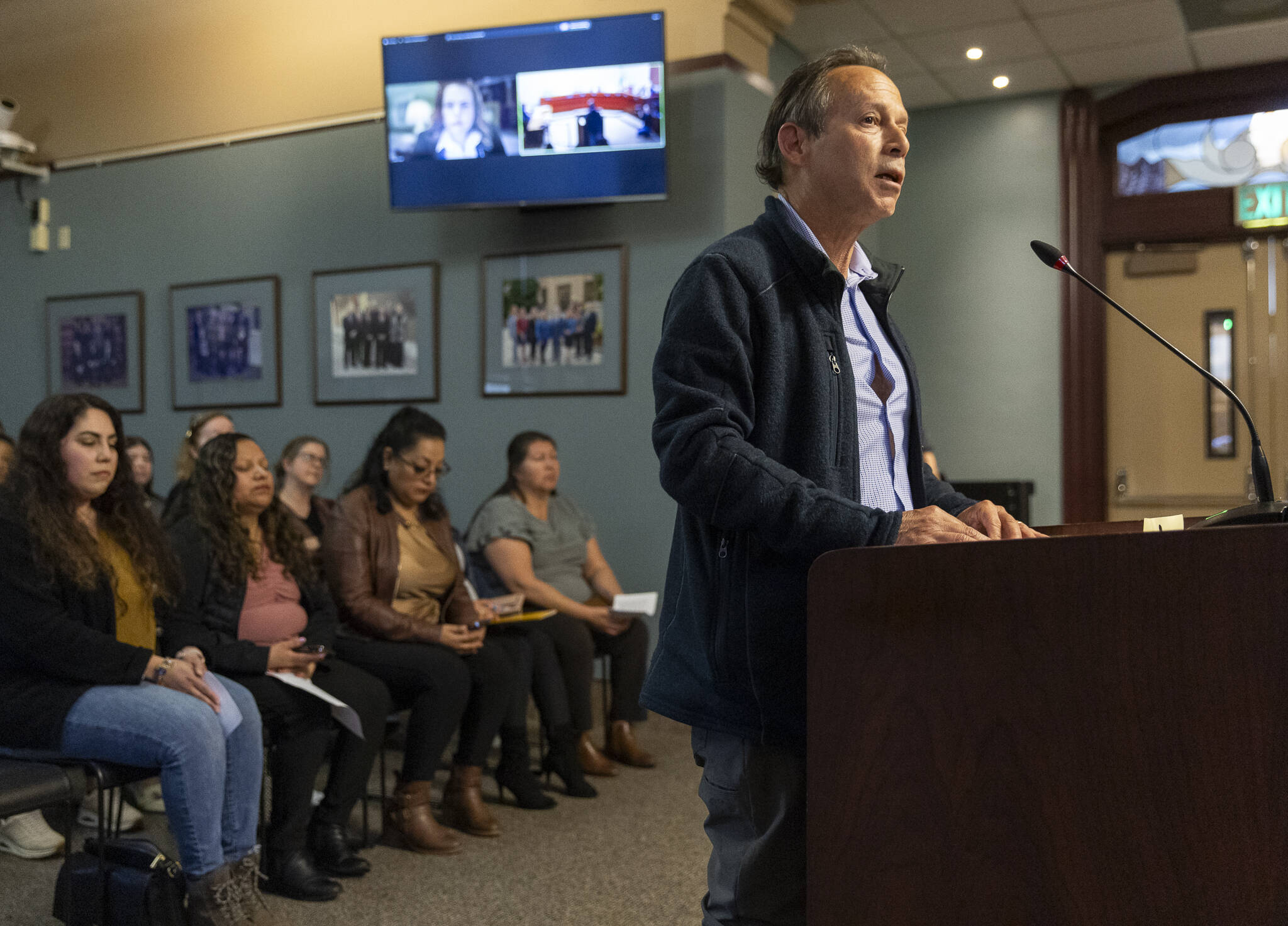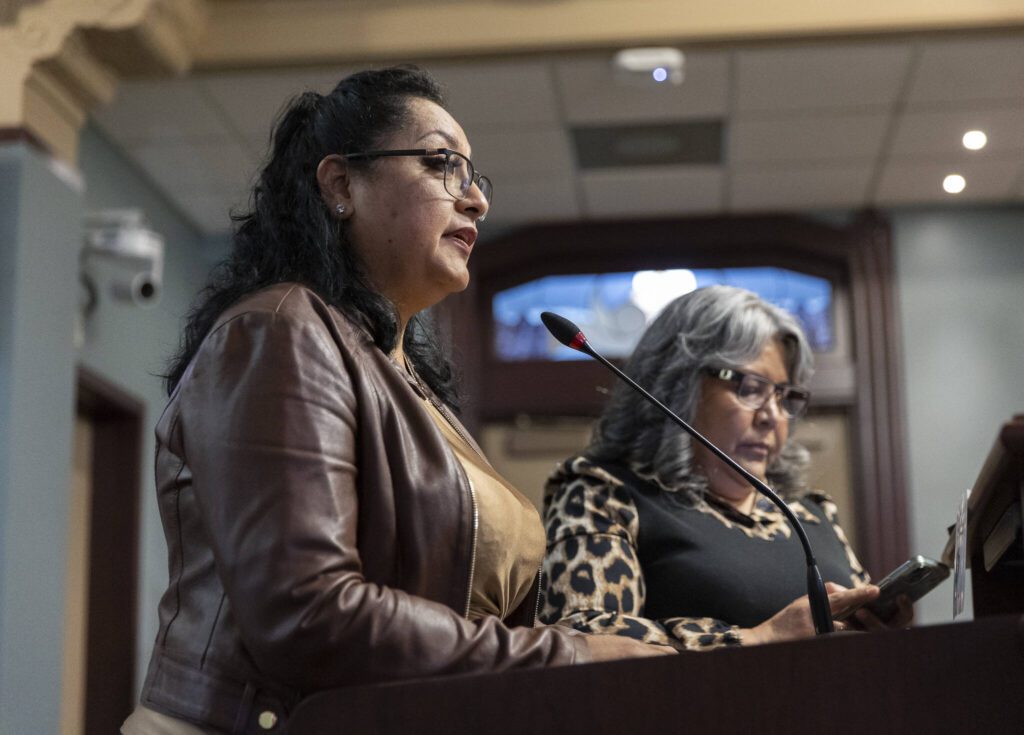EVERETT — In the bathtub. Under the kitchen table.
When 11 people squeeze into a two-bedroom, one-bathroom apartment due to the high cost of rent, these are some of the places they are forced to sleep at night.
Even still, that family in the Casino Road neighborhood of South Everett struggles to make ends meet, said Yajaira Avalos, who shared the family’s story at an April 16 City Council meeting in Everett. Their story is one example of the effects a ballooning housing affordability crisis has on Snohomish County residents.
“Just thinking about raising the cost of their housing would be like shooting them in the foot,” Avalos said at the meeting.
Avalos was one of nearly a dozen community members from the neighborhood who spoke at the Apirl 16 meeting. An interpreter translated many of their testimonies from Spanish to English as they advocated for the city to include affordable housing and anti-displacement policies as part of its periodic comprehensive plan update.
For planners at the city, those policies have been a consideration since they first began work on the update, staff said.
‘Investment without displacement’
As a neighborhood, Casino Road is unique in Everett, said Alvaro Guillen, the director of local nonprofit Connect Casino Road. It’s uniquely diverse, uniquely dense and uniquely affordable.
That uniqueness gives the area strengths. The area has a sense of real community, he said, as residents stick together and help one another. But the people living there also face significant challenges. Many in the area face language barriers — a quarter of the neighborhood’s residents were born outside the United States. Incomes are significantly lower than other parts of Everett, and the area has faced decades of neglect and marginalization, Guillen said.
Casino Road’s lower housing costs relative to other parts of Snohomish County, combined with the rapid growth of Everett as a city, means residents living there face a high risk of displacement. The Puget Sound Regional Council, which maps displacement risk across the region, has flagged Casino Road as an area with high risk.
To complicate matters, Sound Transit’s Link light rail system is set to add a stop in the area when it expands northward to Everett. It’s not going to arrive for more than a decade, but without planning for a likely influx of development and interest in the area, those living in Casino Road right now could be forced out.
“We recognized the risk early in the project,” Everett Planning Director Yorik Stevens-Wajda said in an interview Wednesday. “That comes from both light rail and from just general growth.”
As more people move to Everett — its population grows by about three people each day, Stevens-Wajda said — residents who arrive with higher-paying jobs may be able to out-compete those living in the Casino Road neighborhood. Without building additional housing stock, especially affordable housing, those living there right now face a high risk of displacement.
“That’s displacement even though nothing has actually happened, nothing has been built and nothing has been torn down,” Stevens-Wajda said. “To counteract that, we need to keep adding housing so there’s not this competition for existing units.”
Guillen agrees. Connect Casino Road partnered with a group of nonprofits, including Futurewise, the Housing Consortium of Everett and Snohomish County, as well as the Local Initiatives Support Corporation, to create a detailed memo listing recommendations for the city’s comprehensive plan. They include adding specific anti-displacement policies, requiring construction of affordable units in some developments within high-displacement risk areas and allowing for neighborhood commercial businesses, among others.
“We want investment without displacement to the community,” Guillen said.
Part of the reason for the recommendation memo was a lack of engagement from Casino Road residents in the planning process, the memo read. That was because of barriers faced by residents when it comes to public participation. Many residents don’t speak English, Guillen said, and aren’t familiar with city public comment processes.
The city engaged with residents via events at Connect Casino Road, the Evergreen Branch of its library system and by tabling at summer events, staff said.
In its most recent draft of the comprehensive plan, the city did include all but two: an inclusionary housing requirement for commercial development and adding incentives for development on faith-owned land.
City planners said there are already so many incentives in place to create dense housing that finding additional incentives for faith-owned land was difficult.
“Other than that [inclusionary zoning tied to commercial development], I think we can say it is exactly as recommended or fully in spirit, with just a difference in wording,” Stevens-Wadja said.
Guillen wants to see the city adopt all of the recommendations the memo put forth.
“The bottom line is, we want to ensure that everything the community is asking for stays in,” he said. “This is what the community would like to see in their place, at their home, in their neighborhood.”
‘We’ve grown up here’
For families living in the Casino Road area, housing costs are already prohibitively high.
On April 16, multiple residents shared stories to the Everett City Council of families crowding into small apartments insufficiently maintained by landlords. Many worried that any additional pressure on rent prices would drive people onto the streets.
To them, living in that specific area is also a vital part of their everyday lives. Many don’t drive. The walkability of the neighborhood and sense of community is something that current residents say is irreplaceable.
“What is saddening for our families is that we’ve grown up here, studied here and participated in programs together,” said Veronica Martinez, who has lived in the area for 18 years, in an April 16 public comment. “We have neighbors who I consider family, and they are very worried about what will happen to us, since we have businesses, schools and services very close to us.”
More than two-thirds of workers in Snohomish County don’t earn enough money to comfortably rent an average apartment, according to an Alliance for Housing Affordability report. Only 1.6% of people can afford to buy a single-family home.
“They make unimaginable sacrifices to ensure they don’t lose the roof over their heads,” said Esmeralda Rivas. “They stretch every dollar, cut back on essentials and live with constant stress and uncertainty.”
City staff say measures put in place through the comprehensive plan update should be able to address affordable housing issues, especially in the Casino Road neighborhood, an area which staff has zeroed in on.
“We heard some pretty tough stories of tough living conditions,” Stevens-Wajda said. “I think about some of those kids. It was a good reminder for all of us of why we’re doing this. I think we can feel pretty good about where we’re at with the plan from a lot of those standpoints.”
Preventing displacement in the neighborhood is a top priority for the mayor’s office, as well.
“Significant growth is happening in Everett and with it come transformational opportunities to boost our economy, create jobs and enhance quality of life for our residents. My priority is ensuring that these changes, including light rail, benefit our entire community,” Everett Mayor Cassie Franklin wrote in a statement. “I want to thank the many community members and organizations that partnered with us to co-create a south Everett economic development strategy that prioritizes affordability, prevents displacement and protects existing businesses.”
‘Housing, housing, housing’
There is no “magic wand” that can create abundant affordable housing or commercial space, said Alice Ann Wetzel, Everett’s long-range planning director. But the comprehensive plan’s periodic update works within the systems the city has to create as many incentives as possible to facilitate dense, affordable housing where it is most needed.
One upcoming plan is implementing so-called “middle housing,” new regulations which are set to allow construction of townhomes, duplexes and other forms of denser housing in most areas of the city. Washington passed a law in 2023 mandating large cities implement those regulations.
Middle housing units are some of the most affordable forms of housing developers can build, Stevens-Wajda said. Because it is set to be available almost everywhere in the city, it could offer “new capacity that has never been available, that hopefully will take pressure off and provide new choices,” he said.
Another way the comprehensive plan hopes to focus on Casino Road is through inclusionary zoning, which requires large developments in certain areas of the city to include units affordable to those with incomes lower than the area average. Casino Road is set to be one neighborhood where inclusionary zoning would be implemented.
Inclusonary zoning was also adopted in Lynnwood and Snohomish County via a model code partnership, ensuring other cities along the Link light rail line have similar policies.
Sound Transit worked with city and county governments on the model code partnership. Jaclyn Gault, the community engagement director for the Everett Link extension, said she has heard excitement from locals over the arrival of light rail. But community members also worry about possible changes to the neighborhood and want to protect the unique character of Casino Road.
The agency doesn’t have much power for combating indirect displacement, which occurs because of rising rents or an influx of higher-income renters. That’s up to municipalities, Gault said.
Sound Transit focuses on minimizing direct displacement through construction of its stations. The possible effects of constructing the Everett Link extension won’t be known until a comprehensive environmental impact statement is released, likely in early 2026.
“As a transit agency, we have really limited tools for combating that indirect displacement,” Gault said. “But that doesn’t mean we’re not committed to hearing what the community has to say, committed to hearing their ideas, and committing to working with the jurisdictions and supporting them however we can, because this is a really important issue to all of us.”
Once the comprehensive plan is complete, planning staff will begin working a Casino Road sub area plan. This will have a more focused look at the neighborhood, giving the city the option to rezone certain parcels and incorporate lessons learned from previous work on the comprehensive plan update.
“We have those lessons that we can build on, and we have those lessons in other communities where they were protecting lower-income communities while providing access to transportation,” Wetzel said. “We will be using that framework and lens as we move forward.”
For Guillen, the regulations and affordable housing incentives from the comprehensive plan can’t come soon enough. New transit is coming, change is coming, and he wants to be sure that residents who are living in Casino Road right now are protected.
“My fear is, next week, I see a wrecking ball in front of the church,” he said. “That church didn’t get an incentive. The wrecking balls come down the street, and the inclusionary zoning and requirements for affordable units are not yet in place. Then, it’s too late.”
But if everything stays on schedule, the light rail is still 12 years away. City staff hope to pass the comprehensive plan update by June 30 and complete the subarea plan in the coming years.
Guillen hopes the tight-knit community living there now can actually reap the benefits of those plans. The city hopes they can, too.
“Is this moving the needle on affordable housing? The answer to that is, I think it does,” Stevens-Wajda said of the comprehensive plan on April 16. “It’s definitely complicated. There are many factors and the city can only do so much, but I think we have taken a major step forward to try to mitigate displacement pressure and facilitate and encourage affordable housing. It is housing, housing, housing.”
Will Geschke: 425-339-3443; william.geschke@heraldnet.com; X: @willgeschke.
Correction: A photo caption previously misidentified Yajaira Avalos.
Talk to us
> Give us your news tips.
> Send us a letter to the editor.
> More Herald contact information.





























